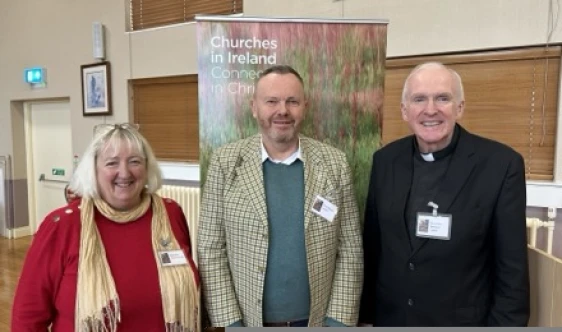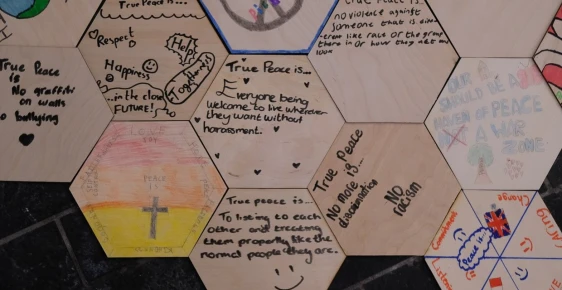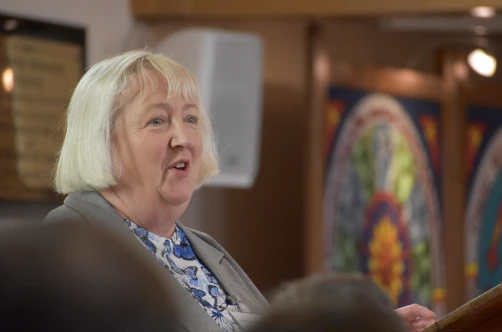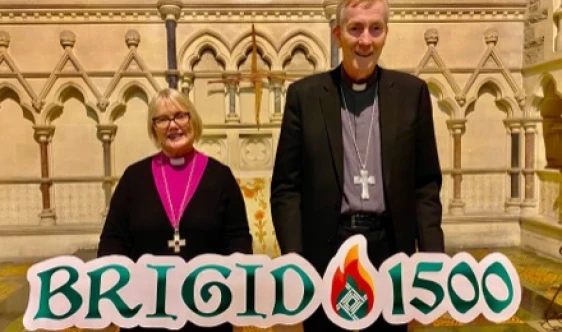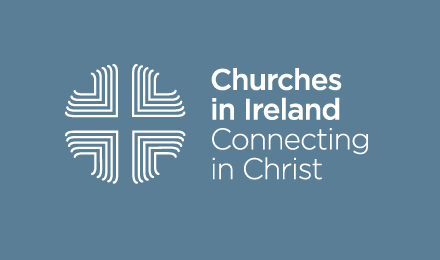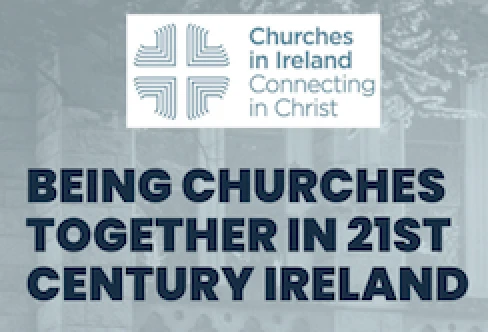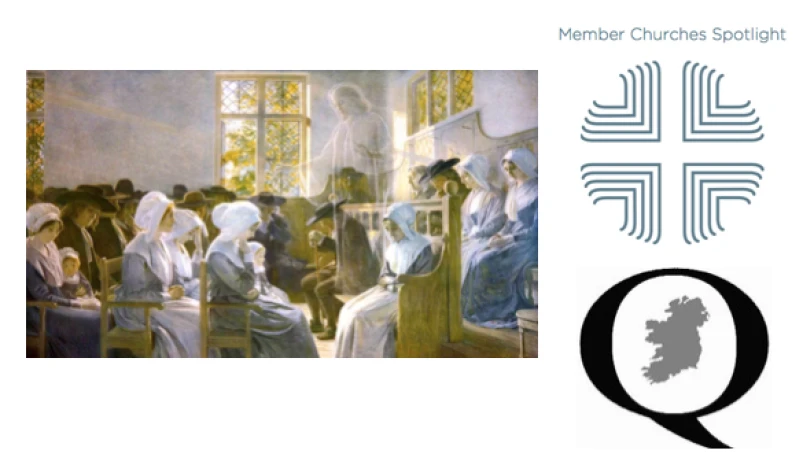
The Religious Society of Friends, commonly known as the Quakers, was founded by George Fox in the North of England in 1652. The Religious Society of Friends in Ireland helped to establish the Irish Council of Churches in 1923 and has been a member of the ICC since then.
Rachel Bewley–Bateman, its current Representative on the Irish Council of Churches Executive Committee, shares some insight into the Church and its life:
What is the history of the Quakers in Ireland?
The first Quaker meeting in Ireland was established in1654 by William Edmundson. He had been in Cromwell’s army, but became disillusioned, and when he went back to England he met some Quakers and became convinced. Subsequently he returned to Ireland and settled in Lurgan where the first meetings were held. Quakers were considered heretics as they refused to swear on the bible (See Matt 5:33–37; James 5:12) or to pay tithes to the Anglican ministers and so were often jailed. This led to an interest in prison work which is still ongoing. Education was always considered important and Quaker schools are still thriving today. The 18th century Shackleton School in Ballitore provided early education to children including Edmund Burke (orator), Napper Tandy (later a United Irishman), and Paul Cullen (who later became Cardinal Cullen). During the 1798 Rebellion Friends were not treated badly – perhaps as a result of the connections they had built up through business and their commitment to non–violence. Friends established businesses, had a reputation for honesty and refused to fight. Throughout the period of the Irish famine in the 1840s, Quakers organised relief for famine victims. Detailed reports and accounts of the work of the Famine Relief Committee exist, which describe the experiences of travelling Friends who toured the country, reported back and helped the building of networks with local Quaker groups and clergy through whom relief was distributed if there were no Quakers in the area.
What does Quaker worship look like?
Quaker worship in Ireland is unprogrammed. Quakers gather in silence for Meeting for Worship. During the meeting it is open to anyone present to stand and contribute if they feel moved to do so. We are meeting in the presence of God, to be led by the Holy Spirit, as the well–known painting, The Presence in the Midst by J. Doyle Penrose depicts. The spirit of Christ is in the centre with the window in the background in the shape of a cross.
Our meeting begins at 11am and the children join in the first 15 minutes before leaving for their own junior meeting, rejoining the main meeting again for the last 5 minutes or so. Meeting houses are plain with no symbols, just a table and a bible with some flowers. There are typically about four or five contributions in the hour and often a common thread emerges and flows through the contributions. We believe that there is something of God, something of value, in each human being. Our aspiration is that God will speak to and through the individual, and that we can reflect on the past week and discern the way forward for the coming one. In this way Quaker faith is integrated into the whole of life, as Quakers believe that Christianity is a way of life, not just to be lived for an hour on Sundays.
What do Quakers believe?
In essentials unity, in non–essentials liberty, and in all things charity.
Early Friends were very well–versed in the Bible. Belief in God, in Jesus Christ, and in the power of the Holy Spirit is the bedrock on which The Religious Society of Friends is founded. They believed that Christ had come to teach his people himself. Instead of subscribing to a set creed we have developed firmly held testimonies (eg.Truth, peace, simplicity, equality), Queries and Advices that each meeting and individual Quaker considers on a regular basis. For example, Query No 7 asks:
Do you live in that life and power which takes away the occasion of violent conflict, and with God’s help work for reconciliation between individuals, groups and nations? Do you faithfully maintain our witness that all war, or preparation for it, is inconsistent with the spirit and teaching of Christ?
This is not just saying war is wrong but requiring Quakers to ask themselves if they are living in such a way that removes situations which may lead to violence.
What kind of study meetings does the Church have?
Many Meetings (congregations) have small group discussions on the Bible or other books. In my meeting on Sunday morning a small group meets at 9:30am to work through the book Quaker Life and Practice, an anthology which describes principles and questions for Quakers to consider in their daily lives. In that way we share in one another’s spiritual journeys.
What does the congregation of the Quakers look like?
In the past, most of those attending Meeting for Worship would have been members of long– established Quaker families. Inter–marriage with people from other churches along with demographic changes mean that now our membership is increasingly made up of people who would have come to Friends (Quakers) from other churches and other countries. So we are now a much more diverse community.
What types of leadership does the Church have?
Quakers have no paid leadership or ordained clergy. We believe in the priesthood of all believers. Therefore we have a committee structure. Usually appointments to committees are for a three–year term, with the possibility of re–appointment for a further period. Representatives are appointed from each local meeting to the Monthly (business) Meeting, and again to one of the three Quarterly/Regional meetings. Quakers have always put men and women on an equal footing. Matters spiritual, financial and practical all have committees that report to the relevant meeting. Decisions in meetings for Church Affairs are made by discerning the “sense” or “feeling” of the meeting and not by voting. Attendance at the national organisational decision–making body, Ireland Yearly Meeting, is open to all members, and to regular attenders with permission. Yearly Meeting’s Committee is the body which deals with the business when Yearly Meeting is not in session. Thus concerns that are raised locally are discussed at each level and are therefore well tested before being decided upon at Yearly Meeting and implemented.
The Friends World Committee for Consultation (FWCC)represents and connects Quakers around the world. It has four sections: Europe and Middle East, Section of the Americas, Africa Section, Asia/ West Pacific Section. FWCC arranges international Quaker conferences. There are Quaker United Nations Offices in New York and Geneva. The Quaker Council for European Affairs (QCEA) is based in Brussels. Quakers are members of the World Council of Churches.
What are the established connections between the Religious Society of Friends and other Churches in Ireland?
The Religious Society of Friends in Ireland is actively engaged with the Irish Council of Churches, the Dublin Council of Churches and various local ecumenical bodies and activities. We have had contacts with the Irish School of Ecumenics over many years. We are members of Eco–congregations Ireland. There are wide–ranging connections with other churches through inter–marriage, education and other activities. We also have interfaith contacts.
Find out more about the Quakers in Ireland here: www.quakers.ie
Official Website of The Religious Society of Friends in Ireland
